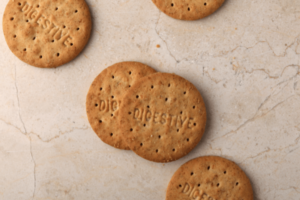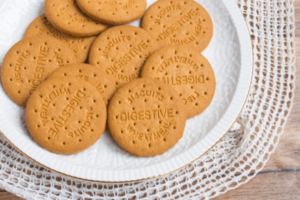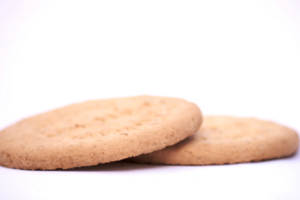Digestive biscuits have been in the trend for some years now. People who look forward to losing weight often opt for digestive biscuits. Nonetheless, even diabetic patients believe in the richness of digestive biscuits and consume them happily. However, are digestive biscuits healthy? Let’s find out.
Before answering the question, let’s look at what digestive biscuits are, their ingredients, and their pros and cons.
Digestive Biscuits

Digestive biscuits are nutritional biscuits that may keep you full for extended periods. As the name suggests, digestive biscuits are named so because they improve digestion. Though digestive biscuits have recently gained popularity, they have been in the market since the 1800s.
Now that we know about digestive biscuits, let’s learn what these digestive biscuits contain, that they are so much talked about.
Ingredients Used for Digestive Biscuits
Digestive biscuits of different companies might have different ingredients. However, whole wheat flour, multigrain flour, sodium, sugar, and hydrogenated fats are the most common elements.
1. Whole Wheat Flour
Whole wheat flour is nutritious and provides a higher amount of fibers. However, digestive biscuits may have lower amounts of whole wheat flour. On the contrary, others have no whole wheat flour present other than the digestive biscuits. Thus, digestive biscuits are considered better than them.
2. Multigrain Flour
Multigrain flour provides the body with different nutrients beneficial for our health. However, multigrain flour is also present in low or minimal quantities and fails to provide significant health benefits.
3. Sugar and Sodium
Sugar and sodium content in digestive biscuits is comparatively high. Higher sodium intake leads to water retention, while more elevated amounts of sugar are dangerous for health. These two ingredients make losing weight questionable with digestive biscuits.
4. Hydrogenated Fats
Hydrogenated fats, popularly known as trans fat or unsaturated fat, are the harmful types of fat that increase the cholesterol levels in the blood, posing harm to our bodies.
Author’s note: Many companies are now making digestive biscuits. Choosing the best one would be hard. Check the nutritional label to ensure that digestive biscuits do not pose any significant harm to your health. Choose digestive biscuits with lower calories, and lower sodium content, with comparatively higher fiber content.
Now that we have understood about digestive biscuits and their ingredients, let’s see if they are healthy.
Are Digestive Biscuits Healthy?

1. Digestive Biscuits Belp Reduce Cravings:
Digestive Biscuits contain Dietary Fiber. The fiber content of whole grains makes us feel fuller for longer, thus, preventing us from consuming any unhealthy food items. Biscuits other than the digestive ones generally have a higher calorie count. You might not be full for long with these biscuits and might soon get hungry again.
2. Digestive Biscuits Betters Digestion:
Dietary fiber in digestive biscuits stimulates the digestive process, alleviating constipation. It also lowers cholesterol levels in the blood, preventing chronic diseases. According to a study published in Mid-International Conference on Public Health, digestive biscuits that are made from whole grain or whole wheat are good as a snack as they have a lot of dietary fiber, which helps regularize bowel movement and clear up constipation.
3. Digestive Biscuits Help in Weight Loss:
Digestive Biscuits with low fat are also beneficial to health. Most biscuits found in the market have higher fats and lesser amounts of fibers.
4. Digestive Biscuits Prevent Chronic Diseases:
Whole grains present in Digestive Biscuits provide significant health benefits too. Whole grains are more nutritious than refined grains. Consumption of whole grains reduces the risk of heart disease, stroke, and even diabetes. According to a study published in the BMJ Journal, an increase in the intake of whole grains reduces the risk of obesity, type 2 diabetes, and coronary heart disease.
Author’s Tip: You can have a digestive biscuit or two post-meals to ensure that you do not get hungry before your next meal.
Now that we have learned the benefits of digestive biscuits let’s take a look at the precautions we should take when consuming them.
What Should I Take Care of While Consuming Digestive Biscuits?

- On average, 2 digestive biscuits account for 150 calories. So, if you are on a weight-loss journey, make sure that you consider the calories you consume through digestive biscuits in a day.
- Some digestive biscuits might have high sodium. A diet with higher sodium poses a risk to the heart and may cause cardiovascular diseases.
- Although digestive biscuits have dietary fiber, they are not substitutes for the fiber obtained through other natural sources. To attain high amounts of fiber, switch to something natural rather than digestive biscuits.
- Check for the sugar content of the digestive biscuits you buy. If the sugar content is high, digestive biscuits might not yield you any good.
- Digestive biscuits do not contain any additional vitamins or minerals. Thus, digestive biscuits do not provide you with any nutritional benefits.
- Some digestive biscuits also contain malt or malt extracts. These agents may be responsible for bloating or flatulence when consumed in excess.
- Some digestive biscuits might have very high concentrations of vegetable oil. The vegetable oil present in digestive biscuits might cause cough.
- Hydrogenated fats or trans fat present in digestive biscuits are pretty unhealthy. These are the fats that stick on your belly for a long time. Hence, make sure that you check the amount of trans fat or hydrogenated fat being used in the digestive biscuits.
Author’s Tip: If you are hypertensive, avoid digestive biscuits.
Having learned both the benefits and risks of digestive biscuits, we are sure you have one question in your mind. We are here to answer it for you.
FAQ
1. How many digestive biscuits should I eat in a day?
Digestive biscuits are healthier than other biscuits or cookies. However, there should still be moderation in the number of digestive biscuits you eat in a day. You should not eat more than 2 digestive biscuits a day. More than 2 digestive biscuits might result in higher calorie and sugar consumption.
You May Also Like To Read:
Best Protein Biscuits in India
Is Peanut Butter Good For Your Health?
Takeaway:
We know that digestive biscuits go perfectly with an evening coffee or tea! We agree that digestive biscuits are better alternatives than your regular cookies as an evening snack. Nonetheless, we want you to think before consuming digestive biscuits in excess.
Digestive biscuits can be healthy, but only when the nutritional content is good and when consumed in moderation. So, the next time you eat a digestive biscuit, be proud of having a healthier option as a snack but also have it in control.
Please drop in a comment and let us know your views about digestive biscuits.



Before there was some print warning on one of these digestive biscuits mention some eatable drugs are involved in order to make it tasty consuming too much can lead to addiction. But now a days that note is missing in every digestive biscuits.